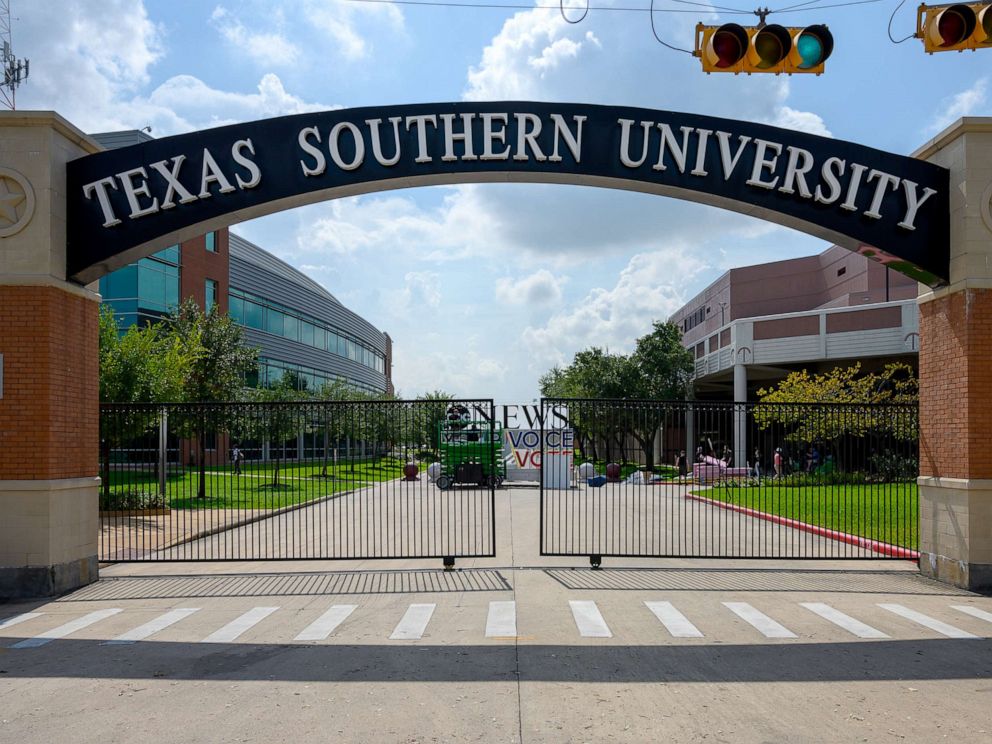Why it matters that the third presidential debate will be held at historically black university
Texas Southern University will be on the national stage on Sept. 12
The third Democratic presidential debate held at Texas Southern University – a public, historically black university – is historically significant, school officials and students said.
Bringing an event of this caliber to the school will not only raise national attention to the issues that matter to African American voters, but it will highlight the mission of historically black colleges and universities, also known as "HBCUs", around the country, school officials, graduates and students said.
“A lot of people don’t even know HBCUs exist, they don’t understand or know the mission of our institutions or why they are still relevant today,” Acting Dean of Texas Southern University, Dr. Rockwell Brown Burton, told ABC News. “Some might argue they are not needed or that they’re not relevant, but I would strongly disagree.”
Texas Southern University was established in a time when Texas was still a segregated state in 1946. After Heman Marion Sweatt, an African American mail carrier, was denied admission to the University of Texas, he and the NAACP sued the university and the state of Texas.
In step with the "separate but equal" doctrine, the Texas State Legislature passed two resolutions to establish the Texas State University of Negroes in 1947. Students petitioned to change the name in 1951 to Texas Southern University and has since championed the idea of embracing diversity.
Notable alumni of Texas Southern include Rep. Al Green, who graduated from the university's Thurgood Marshall School of Law, NFL Hall of Famer and Good Morning America co-host Michael Strahan as well as former congresswoman and civil rights leader Barbara Jordan, who the School of Public Affairs is named after.
"As an alumnus of this esteemed institution, it is truly an honor to witness the third 2020 Democratic presidential debates being held at TSU," Green told ABC News in a statement. "Texas Southern is only the second HBCU to hold such an honor, and it is the first in the state of Texas. This presidential debate shines a light on historically black colleges and universities as highly competitive, inclusive, and worth America's investment for longevity and sustainability. With a diverse group of candidates taking the debate stage, one of whom is a graduate of an HBCU, TSU students and students from all other HBCUs will be able to boast the prospect of one day becoming President of the United States. For that, they can credit, in part, the hope provided on September 12, 2019, on the campus of Texas Southern University."

Jeffrey Lowe, an associate professor at the Barbara Jordan-Mickey Leland School of Public Affairs at TSU, believes that hosting the ABC News debate also offers a powerful symbol of inclusion in a political climate in which the ideas of national identity have been hotly-debated.
“It’s to say that we believe in the inclusion and diversity that our country for years has aspired to. So we’re not going backwards” he said. “It’s this notion of diversity and equity I think that’s really important to lower income communities of color. I think students and faculty will be wanting to hear the conversation about reparations, housing, education and jobs.”
Students say that one of the biggest draws to attending a historically black college or university is that students of color feel embraced and culturally understood.
Kiara Chatman, a junior majoring in finance, said that feeling was evident the moment she arrived on campus.
“Once I got here – just the feeling – no longer having to be a minority – and feeling like oh I actually relate to you, and we like the same things, and we look alike, and its just something that I think the nurturing spirit here from faculty all the way down” she said. “You won’t get that at any other institution.”
And though the candidates will likely pick up on that vibe once they arrive on campus, they should also be prepared for lively conversations with students said Toniesha L. Taylor, department chairwoman and an associate professor in TSU’s School of Communications.
“I think the candidates' tone should be one that’s engaging, that is prepared for informed discussion. They should expect the students, faculty members and members of the community are going to be informed on the issues and should be really engaged in critical conversations” she said.
Topics that could come up in those conversations include reducing high student loan debt, criminal justice reform and reparations.
Former Texas Rep. Beto O'Rourke, South Bend, Indiana, Mayor Pete Buttigieg, and Sen. Cory Booker, D-N.J., have been among the candidates participating in the debate to express a plan to provide reparations to African Americans who are descendants of enslaved people.

With Texas Southern University’s roots based in the civil rights movement, Taylor believes holding this debate at an HBCU will center the conversation around social justice.
And Texas, which is home to one of the largest African American populations in the country, could have a big impact on the election said Carroll Robinson, an associate professor at TSU's Barbara Jordan-Mickey Leland School of Public Affairs.
“I think the Democratic Party believes Texas is in play in part because of the diversity of the state grounded in African-American vote and African-American voter turnout. So I think it’s historically significant that they’re coming to Texas” he said. “Texas is in play because black voters may make the difference here in 2020.”




